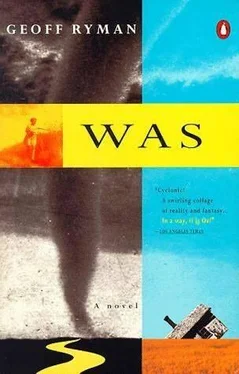He sat still for a moment. Then suddenly he said, in a gathering voice, "Oh boy!" He jumped out of the car. Ira turned to look.
On the corner of Cedar Street, there was a theater. Behind the large white plastic sign, there was another, smaller one. The letters were slotted into bars of metal, Art Deco, three-dimensional:
LOS ANGELES COUNTY OFFICES AND ASSEMBLY HALL
On either side of the entrance were two Art Deco lamps and beside them a long, narrow, frosted window with a kind of trelliswork of metal holding in the glass. On the wall, clumsily hand-painted in black, was another sign, with an arrow:
MENTAL HEALTH UPSTAIRS
Ira sat in the car and looked at Lancaster Boulevard. There was a shop called Windsor, and a J. C. Penney Co. It couldn't have been more ordinary. But it interested him now.
Ira began to look at the book again, the photographs from the water tower first. It was a shock to see just how much of the old town had gone, with its dust, its trees and its wide, wide spaces. He flipped back a few pages and saw a photograph of three sisters on the steps of an airplane. Ira read the caption. Ira covered his face.
Of course! That's why they were here. It was because of Jonathan's play! He was playing the Scarecrow in The Wizard of Oz.
"Jonathan," Ira said aloud in a joke schoolmistress voice. "This is unbelievably tacky."
Ira had only seen the film once, when he was seventeen, and had not thought much of it. The songs were mediocre, the dialogue silly, and the sentiment- There's no place like home -was nauseating. It was all right for kids, but why adults?
Jonathan was loping back to the car. He was carrying a handbill, smiling with anticipation. Jonathan looked sweet and goofy and he could dance. Perfect casting for a scarecrow, Ira thought. Ira looked at the man he loved but did not desire.
"A theater on Cedar Street!" called Jonathan, as if something had been vindicated. "They're still doing it. They're still putting shows on for each other just as if L.A. were a thousand miles away."
"Jonathan," Ira said. "Judy Garland?"
Lancaster, California-1927
Where is Vaudeville? -Confused child to Jack Haley
In 1894, Horace Henderson Wilcox, a Kansas prohibitionist, bought 120 acres near Los Angeles for his country home. His wife called the place Hollywood…
The fine weather was certainly a major incentive for many companies to move their entire organisations to the West Coast, but Hollywood offered another advantage. An industrial dispute, known as the Patents War and fought with weapons and violence enough to justify the term, had forced several producers to flee… These producers had infringed the Edison patents by making equipment built from pirated designs… Hollywood offered an ideal sanctuary for refugees of the Patents War, for should trouble appear, the Mexican border was a mere hundred-mile drive away.
– Kevin Brownlow, The Parade's Gone By …
It was cool inside the movie house. Daddy kept it cool. There was a beautiful woman in the movie and Frances knew why it was so dark around her eyes. It was the black that you put on your eyelashes when you sing. Only people couldn't sing in movies because there was no sound. That was why people needed Frances and Jinny and Mary Jane. You could only sing on stage.
It was Daddy's movie house and everybody in town knew him and everybody in town knew Frances. They had come here from Grand Rapids, where Granny lived, but that was a long time ago, almost before Frances could remember, though it must have been nice, because everybody, Mom and Jinny and Daddy, they all said so, because Grand Rapids was cool and green. Lancaster was flat and hot. Hot enough to fry an egg.
In the movie a man had been running along the tops of the skyscrapers and had fallen off and now he was hanging on to the hands of a big clock. Frances laughed, ha ha, very forcefully and kicked her legs and looked to make sure her sisters were laughing. If her sisters were laughing, it would mean the movie was meant to be funny, and Frances wouldn't have to be afraid for the man. Virginia and Mary Jane were laughing and looking at her, to make sure she was okay, so she grinned, very hard, to make sure they could see she was happy.
Daddy's movie house. Frances said it to herself. They were all together in Daddy's movie house. They were all part of the show together. Mom played the piano and Daddy sang, and Jinny and Mary Jane sang. Baby Frances sang. And everybody came to see them.
The man in the movie was swinging from a rope now. It was caught around his ankle. He swung between skyscrapers, up and onto a roof and suddenly he was safe, and his girlfriend was there and hugged him and everybody clapped. Frances clapped too, though she always found the endings of movies a mystery. Why end there, when it could have ended anywhere? Why end there when he could have gone on running for as long as he liked? But Frances cheered. "Yayyyyyy!" She cheered because it was Daddy's movie, because they always cheered each other.
"You like that, Baby?" Mary Jane asked, as the lights went up.
"I surely did," said Frances, with a sideways wobble of her head that she had learned from her father. Frances liked Mary Jane just a bit better than Jinny, her middle sister. Mary Jane was older and kinder. And she had a huge, wide smile. Frances wanted to have a smile like hers when she grew up. Everybody always said that Jinny was pretty and they never said that about Mary Jane, but Frances thought different.
"We're going home now," Frances announced, and slid down from her seat, her pretty white dress riding up. "It's time," she explained. Her sisters smiled and shook their heads and followed as Frances stomped up the aisle in round-toed buckle shoes. One strap flapped.
Frances generally did whatever she liked, expecting people to like what she did. She went up to Harriet, who wore a red kind of suit and a red hat. "Have you seen my daddy?" she demanded.
"He'll be out front, Baby," the usherette said. "Good movie, wasn't it?"
"Oh yes, it surely was," said Baby. "But movies can't sing." She didn't really like movies. "Can you buckle my shoe for me?" She stuck out her foot, toes curled down like at ballet class. "It came unbuckled."
"That's okay, Harriet, one of us will do it," said Jinny, echoed by her older, shyer sister. It was her older, shyer sister who crouched down to do up the buckle, quickly, almost furtively.
"You don't have to buckle my shoe now," Frances reassured Harriet. She didn't want Harriet to feel she had missed out. "You coming along to the show tonight?"
"Um," said Harriet.
Jinny laughed. "She's probably already seen it a hundred times, Baby." Jinny did not always make Frances look good.
Frances knew how to deal with that. "That's why we do it different each time. We do different songs, don't we, Harriet?"
To Frances's great pleasure, Harriet agreed. The shoe was buckled. "Goodbye, Harriet!" called Frances as they were leaving. Then Frances ran up the aisle to find her daddy.
She found him in what her mother and no one else called the foyer. Daddy was there talking to some men, and Frances ran up to him, shouting, "Daddy, Daddy, it was good!"
Her father laughed and scooped her up and swung her around. "You bet it was!" he said and gave her a shake. "I was thinking of you when I booked it!" He turned toward the two men. "Hey, boys, this is my little girl. This is Frances."
Frances saw then that the two weren't men at all, but teenagers. Frances didn't like them. They didn't know how to smile. Their smiles were all twisted, and their feet shuffled, and their hands were in their pockets. They looked like they could be rough. "Hiya, Kid," one of them managed to say, with a voice with a catch in it, as if a string had been plucked.
Читать дальше












